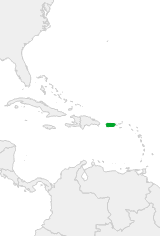Puerto Rican Woodpecker
The Puerto Rican Woodpecker, or Carpintero de Puerto Rico, can be found in all treed habitats on the islands of Puerto Rico and Vieques. These handsome birds are fairly sociable; although territorial during the breeding season, pairs often join with other individuals to form larger groups during the nonbreeding season. During this time, groups may join together in bouts of calling. Parenting duties are shared by both sexes, and they continue to feed young for at least a few weeks after fledging. They are omnivorous.

General Information
Range

Habitat
Puerto Rican Woodpeckers are common in most wooded areas of Puerto Rico, including mangroves, shade coffee groves, coconut plantations and Honduran pine plantations. It is more abundant in shade coffee plantations than in native forests. Although it is found at all elevations within the El Yunque rainforest, it is less common there than in the Guánica Dry Forest. In urban areas (San Juan), they prefer small to medium-sized forest patches.
Food
Puerto Rican Woodpeckers are omnivorous, eating a wide variety of animals as well as fruit. Other animals eaten include dragonflies, worms, spiders and coqui frogs. Additional fruits eaten include figs, and fruits of Cecropia peltata and Schefflera morototoni.
Behavior
Puerto Rican Woodpecker behaves similar to the Red-headed Woodpecker and “ant-eating woodpeckers of the United States”; like most woodpeckers, they have an undulating fly. Puerto Rican Woodpeckers sunbathe on exposed branches or snags, particularly in the early morning. They are territorial during the breeding season, but not during the nonbreeding. Pair bonds are maintained throughout the year. Although pair bonds are looser in the nonbreeding season, females often follow males while foraging.
Nesting
Puerto Rican Woodpeckers can excavate nest cavities in both dry and breeding seasons, but more commonly excavate cavities starting in January or February. There may be a delay between cavity completion and egg laying. Nest cavities are constructed in a variety of live and dead trees, including coconut palms, almond trees, Honduran pine and other. They also may nest in telephone. Cavities are usually 3.5-6 m high, but may be as low as 1 m.
How to Identify
Typical Sound
Appearance
Size and Shape
The adults have a wing cord extension of roughly 12 cm in males; and 11.5 cm in females. The Adult mean weight is approximately 65 grams in males, and 55 grams in females.
Color Pattern
The Puerto Rican Woodpecker has steel-blue upperparts, wings and tail, with a white rump, a white mask meeting above the bill, and brownish underparts with variable amounts of splotchy red (males have more red than females).
Similar Species
The Puerto Rican Woodpecker is the only woodpecker normally seen in Puerto Rico. Yellow-bellied Sapsuckers are rare winter visitors but could not be confused with the Puerto Rican Woodpecker.
Fun Facts
Did you know?!
- It is known that unlike many woodpeckers, they are omnivorous, eating a wide variety of arthropods and fruits. However, many aspects of their life history and behavior are not well understood.